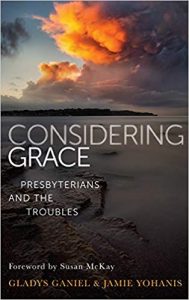 Claire Mitchell has reviewed Considering Grace: Presbyterians and the Troubles, by Jamie Yohanis and me, in Northern Ireland’s Fortnight magazine (January 2022 edition).
Claire Mitchell has reviewed Considering Grace: Presbyterians and the Troubles, by Jamie Yohanis and me, in Northern Ireland’s Fortnight magazine (January 2022 edition).
Mitchell, a writer based in Belfast and a former sociologist at Queen’s University, calls the book ‘an unflinching view of intergenerational trauma’.
You can read the full review here: MitchellReviewFortnight51-No-484-ONLINE-48-49
I have reproduced some excerpts below.
Considering Grace: Reviewed by Claire Mitchell
Considering Grace is a gritty and poignant exploration of how the Presbyterian Church in Ireland tried – and often failed – to hold their people together during the Troubles. It is a story of two ecosystems – a church suffering unbearable pain, and a church taking risks to build peace. Intertwined and in tension with one another. The two parts of the whole held together by faith and community, but also by omission. An awkward silence on a violence that was impossible to bear.
The book is based on interviews with 120 Presbyterians from border counties in Ireland, north and south. This borderlands location is a somber backdrop to each story. Every interviewee had family members or colleagues killed during the Troubles. Many lost parents or children. As a result, the book is a brutal and unflinching account of intergenerational trauma. Ganiel and Yohanis unravel how this trauma played out in various people’s lives – Presbyterian ministers, victims, members of the security forces, loyalist ex-combatants, those impacted by loyalist violence, emergency responders, peacemakers and politicians.
Nearly every interviewee talks about their experiences as vivid and ongoing. Ganiel and Yohanis’ writing does well to communicate this visceral quality to the reader. For example, they introduce Neil – a member of the security forces left in crippling pain after he was shot. He can no longer sit on a hard church pew. Neil does not feel that the Troubles are over. Gladys and Yohanis write how Neil points to his own heart – “[t]he Troubles are in here.”
… The accounts of Presbyterian ministers as ‘first responders’ are striking. From identifying bodies, sitting with grieving families night and day, mediating physical violence, to making public responses to the conflict – all of these became the job of ministers, who had perhaps joined the clergy envisaging a very different kind of life. Some clergy faced physical threats and some were exiled. Most were just exhausted. One church had a contract with local glaziers to come in every Monday to fix the windows that had been broken at the weekend. Such was the level of normalcy of this deeply abnormal situation. The emotional toll of the work was relentless.
… There are times in the book when the historical spirit of Presbyterian radicalism bursts forth. This is not expressed in constitutional politics, which the modern PCI has steered clear of. Instead it emerges as ecumenism, peace-building, going out of one’s way to be in relationship with Catholics. This is radical in a different way from the Dissenters of the past. But no less progressive in the context of the Troubles. A senior church figure, Lynda Gould, asks at one point, ‘who are the keepers of the story of the common good within Presbyterianism?’ And I suspect that the answer is that Lynda herself, and the other quiet peacemakers featured in the book, are the keepers of this story.
Considering Grace is a deeply humane book. Stories are told plainly and factually. There is just enough detail to grasp the depth of the interviewees’ trauma, without invading their privacy. Regardless of readers’ political persuasion, it would be impossible to be unmoved by their collective lament. The Presbyterian Church did not have a settled voice during the Troubles. It has been criticised for going too far with peace-building and not going nearly far enough.
Should it have done more to build peace? Unquestionably the answer to this is yes. The book supports John Brewer’s view that the church often stood back and left it to mavericks to forge relationships with Catholics, nationalists and republicans. It did not fully support the work. And so, while the Presbyterian Church tried to absorb the pain of its members during the Troubles, it did not do enough to transform it.
However, as Ganiel and Yohanis reflect, this may have been too much to ask – particularly from the victims of violence. Some victims could and did engage in peace building work. But it made many feel hurt and abandoned to see the church reach out in this way. This tension remains unresolved – and the book is explicit in allowing space for that friction. Letting stories of pain sit beside stories of peace activism, knowing that the two may never be reconciled.
The question now is what the church might learn from its experiences? The struggles the current Church faces are very different from during the Troubles. It has declining numbers and has been undergoing a conservative turn. It is a place where women clergy often feel undermined. It seems not to know how to love its LGBTQ+ members. But it is a broad church. It has always been big enough to include both keepers of the radical story of Presbyterianism, and those who crave traditional theology.
But can the modern church hold these in balance?
The book offers no comment on this. Other than a call for the Church to acknowledge the suffering of its people and to be self-critical. The fact that the PCI commissioned this book themselves, and were prepared to look their congregations’ pain in the eye, is itself a sign that this hard work is conceivable. And, of course, as the book invites, the Church must ‘consider grace.’ A task which is ‘difficult, but humanly possible.’ This may be as good a map for the future as any.